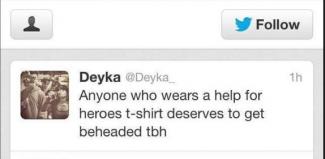
When Deyka Hassan went to her local police station, she must have been scared, or perhaps angry – over the past few hours, she had been receiving a torrent of abusive messages on Twitter.
Some told her to go back to Africa. Others told her to "please die". One tweet said: “Hope your mum got raped.” Another said: “I’d easily do life in prison to burn you alive.” And another: “You deserve to be set on fire.”
These were replies to what she had tweeted that afternoon. Hours after a soldier was brutally murdered in Woolwich, Hassan wrote: “Anyone who wears a Help for Heroes t-shirt deserves to be beheaded tbh.”
Abusive messages
She was arrested after seeking help at her local police station. Eventually, she admitted to sending a malicious tweet, although she maintained that she had intended it to be a jokey criticism of the t-shirt’s design.
It appears that the users who threatened to rape and kill her were never dealt with.
For sure, Hassan’s tweet was offensive, insensitive, and tasteless. Yet so were the messages she received.
This approach seems particularly hypocritical when considering that police recently arrested users who sent threats to the Twitter accounts of MP Stella Creasy and feminist campaigner Caroline Criado-Perez.
Hypocritical
In July, Ms Criado-Perez received a stream of aggressive tweets after her successful campaign to put Jane Austen on the new £10 note. When Ms Creasy expressed support for the campaign, she was subjected to similar threats. One man was bailed pending further investigation.
It seems to me that the tweets Hassan received – some of them direct threats, not to mention full of racist and misogynistic slurs – were more serious than the one she sent.
And while Hassan’s tweet may have offended her 600 followers, was it not her right to express this view, joke or not? She did not threaten to behead someone.
You could argue that she simply got the timing badly wrong. Her throwaway comment turned into something far more offensive at a time of heightened public sensitivity.
Throwaway comment
When applying law to Twitter, the police and the courts must be careful not to restrict freedom of speech. Yet direct threats ought to be investigated.
You might say that police are unable to deal with large numbers of abusive tweets and that they cannot arrest thousands of users, but neither can we prosecute every tasteless joke on the internet. Nor should we – because doing so would be censorship.
In any case, the ever-changing internet makes it hard to create or apply specific laws. Deciding which tweets are malicious is difficult – every person has their own, highly subjective offensive-o-meter.
Censorship
So what to do?
For a start, it is important to distinguish between direct threats and misguided attempts at comedy.
The courts ought to deal with threats and abuse directed at users. Yet most other comments, however vile or ridiculous, are not worth the judges’ time, nor indeed the taxpayers’ money.
Hassan’s comment was not the funniest joke to ever appear on the Twittersphere, but did she really deserve a criminal record? Did those 70 characters warrant prosecution? I don't think so.
Above all, our right to speak and tweet freely must be defended, and that includes our right to look like a fool on social media.
